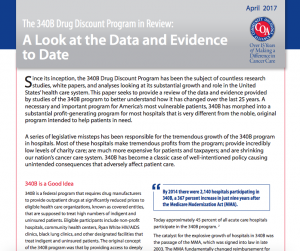COA Compendium Paper Collects Findings from 25 Years of 340B Drug Discount Program Research
White Paper Released at 2017 Community Oncology Conference Provides Comprehensive Reviews of 340B Data and Evidence
We need to ensure that the savings from 340B go directly towards helping patients in need, not hospital profits and CEO bonuses.”
WASHINGTON, DISTRICT OF COLUMBIA, UNITED STATES, April 28, 2017 /EINPresswire.com/ -- A compendium released today by the Community Oncology Alliance (COA) compiles the findings of research studies, white papers, and analyses looking at the growth and impact of the 340B Drug Discount Program on the United States healthcare system over the last 25 years. The findings clearly show that 340B has grown substantially, morphing into a profit-generating program for most hospitals that is very different from the noble, original program intended to help patients in need.— Jeff Vacirca, CEO of NY Cancer Specialists and president of COA
Examining 25 years of data since the 340B program’s beginning in 1992, the compendium, “The 340B Drug Discount Program in Review: A Look at the Data and Evidence to Date” was released today at the 2017 Community Oncology Conference. The paper focuses on the origins of the 340B program and data on its growth, particularly in hospitals. According to a report by the Medicare Payment Advisory Commission (MedPAC) to Congress, by 2014, there were 2,140 hospitals participating in 340B. Today, approximately 45 percent of all acute care hospitals participate in the 340B program.
• Read the full compendium paper "The 340B Drug Discount Program in Review: A Look at the Data and Evidence to Date."
“340B is an invaluable program for community and safety-net providers, including rural hospitals. However, for most 340B hospitals, despite providing relatively low levels of charity care, it has become a significant profit generator,” said Jeff Vacirca, MD, FACP, oncologist, CEO of NY Cancer Specialists in Long Island, NY, and president of COA. “What the data and evidence clearly show is that we need to halt the unsustainable growth of 340B in order to save it. We need to ensure that the savings from 340B go directly towards helping patients in need, not hospital profits and CEO bonuses.”
The paper compiles the latest evidence on the profits 340B hospitals make while providing low levels of the requisite charity care. The 340B program does not require that the savings on drugs be passed on to lower patients’ costs. In fact, a report by the Office of Inspector General (OIG) found that two-thirds of hospitals do not offer the reduced 340B prices to uninsured patients – the very patients 340B was designed to help. The compendium concludes that 340B has become a classic case of well-intentioned public policy causing unintended consequences.
"We have long known that 340B is a good program gone really, really bad, and the 25 years of data captured in this compendium clearly shows that,” said Ted Okon, executive director of COA. “Contrary to misleading claims by 340B hospital advocates that the program only hurts pharmaceutical companies’ bottom lines, the facts document that 340B expansion in hospitals is having an adverse impact on patient care and finances, Medicare and taxpayer budgets, and is fueling drug price increases.”
The annual Community Oncology Conference is the most comprehensive community oncology conference in the country. With more than 1,300 attendees, the conference has three distinct agenda tracks with content covering clinical, business, and advocacy topics. The 2017 theme is “Fueling the Cancer Moonshot: Innovation in Community Oncology.” The conference is currently taking place April 27-28 in National Harbor, MD, right outside of Washington, DC.
Read the full compendium The 340B Drug Discount Program in Review: A Look at the Data and Evidence to Date at http://bit.ly/340bcompendium.
###
About the Community Oncology Alliance: The Community Oncology Alliance (COA) is a non-profit organization dedicated solely to preserving and protecting access to community cancer care, where the majority of Americans with cancer are treated. COA leads community cancer clinics in navigating an increasingly challenging environment to provide efficiencies, patient advocacy, and proactive solutions to Congress and policy makers. To learn more about COA visit www.CommunityOncology.org.
Nicolas Ferreyros
Community Oncology Alliance
6466854262
email us here

